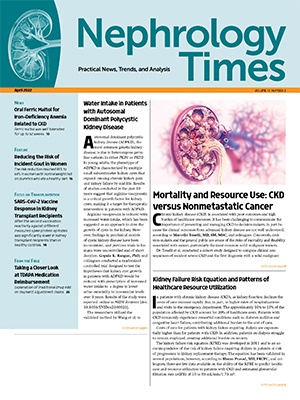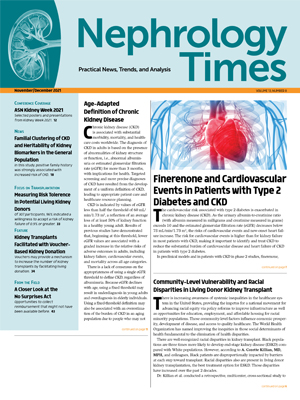
Patients who have missed multiple dialysis treatments, particularly those who have initiated dialysis recently, are at risk for dialysis disequilibrium syndrome (DDS), which presents as a rare neurological complication. According to Rupesh Raina, MD, FACP, FAAP, and colleagues at the Cleveland Clinic, Akron, Ohio, and the Akron Children’s Hospital, the conceptual pathogenesis of DDS is likely a result of multiple physiological abnormalities.
The researchers explored DDS and preventive measures with a focus on effective management strategies for DDS. Results of the reviews were reported during a virtual poster session at ASN Kidney Week 2021 in a poster titled Dialysis Disequilibrium Syndrome (DDS) in Hemodialysis Patients: A Systematic Review.
The literature search was conducted on PubMed/Medline and Embase. Studies were included irrespective of age and sex of participating patients. Data were analyzed and a summary table was extracted with the following variables: study type, population group, age, patient characteristics, blood and dialysate flow rate, and study outcome. A descriptive analysis was performed analyzing the population size and frequency of symptoms and treatments utilizing the R software.
The search identified 49 studies that were included in the analysis. In 48 of the 49 studies, 72.4% of patients reported having DDS. The most common symptoms reported were headache (39.4%), nausea (40.4%), vomiting (39.1%), confusion (66.7%), and seizure (78.6%). In the current sample, 12 studies switched from hemodialysis to alternative modalities of dialysis, including continuous hemofiltration/hemofiltration or peritoneal dialysis, with no further reported DDS symptoms.
“We have provided a comprehensive clinical practice points for both the pediatric and adolescent and young adult population,” the researchers said. “Interestingly, DDS was reported more often in the early dialysis era prior to recent advances and improvements of resource allocation. Existing literature shows it is crucial to recognize symptoms of DDS and implement timely prevention to improve outcomes.”
Source: Raina R, Singh SS, Chakraborty R. Dialysis disequilibrium syndrome (DDS) in hemodialysis patients: Systematic review. Abstract of a poster presented at the American Society of Nephrology virtual Kidney Week 2021 (Abstract PO0928), November 2021.





 © 2025 Mashup Media, LLC, a Formedics Property. All Rights Reserved.
© 2025 Mashup Media, LLC, a Formedics Property. All Rights Reserved.